#The Decalogue
Explore tagged Tumblr posts
Text
The Decalogue vietsub

Nếu Mười Điều Răn thực sự do Thiên Chúa đặt ra, chắc chắn chúng không nhằm mục đích kỷ luật con người, mà để cho họ biết họ bất lực đến mức nào và số phận của họ là không thể tránh khỏi phạm những tội lỗi này.
0 notes
Text
Out of Sight, Out of Mind
9 Then Moses and Aaron, Nadab, and Abihu, and seventy of the elders of Israel went up, 10 and they saw the God of Israel. There was under his feet as it were a pavement of sapphire stone, like the very heaven for clearness. 11 And he did not lay his hand on the chief men of the people of Israel; they beheld God, and ate and drank. 12 The Lord said to Moses, “Come up to me on the mountain and wait…
View On WordPress
#Exodus#Exodus 24#God#grace#holiness#mercy#Moses#Mount Sinai#the Decalogue#the face of God#the glory of God#the Ten Commandments
0 notes
Text
hashem fingers ten phrases into stone, passes them to moses. moses hurls these against sinai, shattering them. hashem then tells moses new phrases, similar but not the same. you shall be foreign, you shall not make votives, you shall keep festivals, you shall give to me the first of each womb entrance, you shall not appear to me empty-handed, you shall not hand me leaven yet you shall hand me ripe fruit, and, finally, you shall not boil a kid in the mother's milk. these are written on the stones that are placed in the ark, that chest, that body of hashem kept in a tent, fed brown bread and oil, through exodus. these phrases—the yahwist, ritual decalogue of exod 34:11–27—need to be held. festival, votive, womb, empty, milk, ripe, foreign
#thinking#i think this version of the decalogue (j source-OLDER) matters as much as if not entirely more than the ten we were taught at ccd#yk the ccd class we were all in. i rmr you there
67 notes
·
View notes
Text

23 notes
·
View notes
Text

the book of company, hymn 11.6.01 🍋🥦
[for @decaloguezine] ✨
#decalogue#sweet religion#citrinabeth#belizabeth brassica#citrina rocks#acoc#a crown of candy#dimension 20#d20#art
271 notes
·
View notes
Text
I've drawn RLM before and have attempted to caricaturize them in various ways so I'm a huge nerd about this and by looking at a disgusting amount of pics and videos I followed a certain pattern and rules given by their facial features that I see Rich followed as well. I found with trial and error that to convey Best that That's Them.
I shall call the rules I found that are shared with Rich's versions the RLM Caricaturist Decalogue. You Can not follow this (cough at your own risk cough), this def isn't meant as like, follow this or you suck bc I do believe certain things can be adapted differently if the skills allow, but I personally found this super helpful to navigate drawing them (although it can also be that you have all these elements and it still doesn't look like them):
Mike's prominent and arched eyebrows
Mike's small turtle mouth (with the sole exception being when he makes exaggerated expressions)
Mike's pointed ears
Mike's widow's peak
Jay's pointy angular nose
Jay's small triangular eyebrows
Jay's mustache covering a great deal of his upper lip
Jay's borderline rectangular-shaped hairline (and the specific way it blends into his sideburns from his temples)
Rich's slouchy posture
Rich's prominent eyebags
Rich's rounded button nose
Rich's receding, rounded hairline with a tuft of hair at the front center
#ignore me i'm thinking about knox' decalogue like a nerd#blortchmod#jay#rich#mike#there's more like their height relations but i'm talking strictly abt them as individuals here#btw these rules can be interpreted many many ways#according to this 1 2 3 and 6 weren't followed consistently by the prev designs for example.#tho things like face shape etc. i think were ok
30 notes
·
View notes
Text










#Bible#Ten Commandments#oldest stone tablet#Old Testament#Sotheby's#auction#late roman-byzantine era#artefact#ancient world#ancient civilizations#excavation#Israel#paleo-hebrew script#Samaritan Decalogue#Samaritanism#Mount Gerizim#Jehovah#Mount Zion#West Bank#Book of Exodus#historic artefact#western civilization#history#Codex Sassoon#ancient bible#human history
6 notes
·
View notes
Text
Catechism of the Catholic Church
THE TEN COMMANDMENTS
1 I am the Lord your God: you shall not have strange Gods before me.
2 You shall not take the name of the Lord your God in vain.
3 Remember to keep holy the Lord's Day.
4 Honor your father and your mother.
5 You shall not kill.
6 You shall not commit adultery.
7 You shall not steal.
8 You shall not bear false witness against your neighbor.
9 You shall not covet your neighbor's wife.
10 You shall not covet your neighbor's goods.
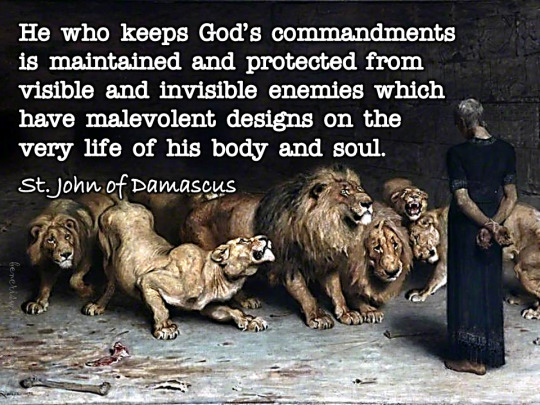
53 notes
·
View notes
Text
my #truth:
ep 1 = ep 7 (beatriceless)
ep 2 = ep 6 (furniture)
ep 3 = ep 5 (tools)
ep 4 = ep 8 (ange focus)
#.me#umineko#weird fucked up mirror structure tht barely makes sense. but i will try to explain in the tags regardless#ep 1 and 7 revolve entirely around beatrice without her actual presence#if anything in both it’s her lack of presence that sets the mystery of the episode in motion#one is the introduction to her story and the other is the conclusion of it. fairly straightforward tbh#ep 2 and ep 6 again have very obvious similarities in that they are both shkanontrice episodes#we also have the starting point and ending point of beabato’s relationship. starting with biting and killing and ending with marriage. waho#battler’s first real gameboard vs battler’s last real gameboard. i cld go on but the shkanontrice focus is probably the meat of it#ep 3 and 5’s connection is a bit looser… ep 3 is the first to introduce the braun tubes/catbox to fight using antifantasy#and ep 5 gives us the decalogue to fight using mystery. both give battler/the player tools to understand the rules of beato’s game#we also get ronove/virgilia on one hand and erika/dlanor on the other which are extensions of the tools/concepts themselves#ep 4 and 8 is self explanatory. theyre the Ange episodes and the endings of their respective arcs. both begin and end with ange’s journey#and her trying to find the truth. really theyre so similar in theme (+ content tbh) it is probably the most obvious of these#anyways. it is an actual mirror structure if you consider 4 + 8 as epilogues… <— strying to make it work.#thinking abt umineko at 8 am the grind never stops *trips falls dies
15 notes
·
View notes
Text
Decalogue: Four
Someone submitted a link to this movie to me and I can't seem to find the post. However, I just watched it.
youtube
The movie is called Decalogue: Four and the entire thing is available on YouTube with English subtitles. It is a polish made-for-TV movie from 1988 that was part of a series of 10 movies inspired by the ten commandments. This one is Honor Thy Father and Mother (#4). It is about 55 minutes long.
When her father is away on business, a young woman discovers a letter from her dead mother reading, 'Open after my death'.
It's about Anka and Michal, a father and daughter with a very close relationship that crosses the border into suggestive. Anka finds a letter telling her that Michal is not really her father, and when she confronts him, he admits that he had always suspected. She comes on to him, but he resists, though it's clear there's a part of him that's interested. She confesses later that she actually never read the letter and made up the contents. They agree to burn it. However, a fragment is left that heavily implies it said what Anka had pretended it said.
My conclusion is that he's not her biological father but I suppose it's technically ambiguous.
I definitely recommend it for adopted father/daughter fans.
#ask follow up#first post#decalogue: four#adopted father and daughter#canon#anka and michal#source#video#Youtube
10 notes
·
View notes
Text
Politicians will say “we should put the Ten Commandments in school classrooms!” And then put a bastardized version of the Decalogue from some stupid movie in said classrooms. Like bucko, if you’re going to subsume my religion into the state you might as well do it right, but no, apparently that’s too hard. I personally think that if you want to tear down the walls protecting the Church from being interfered in by the government and vice versa then obviously you don’t understand why it’s there, but you should use at least one Decalogue variation that’s accepted by an actual variant of Christianity (or another Abrahamic religion!) instead of the idiotic populist Disneyland version of Christianity. Then again, it’s not like the people doing this stuff follow the Decalogue anyways, so might as well not use the real one.
#christianity#decalogue#ten commandments#separation of church and state#It’s best for the church and best for the state!#please stop#us politics
3 notes
·
View notes
Text
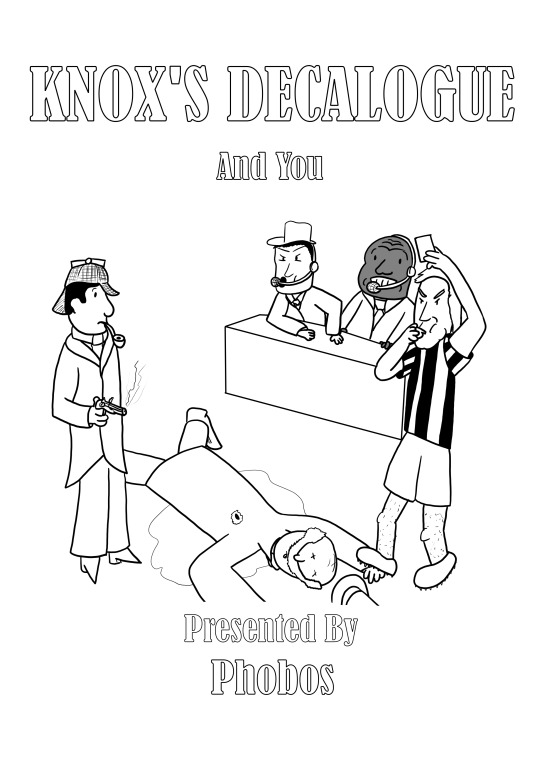
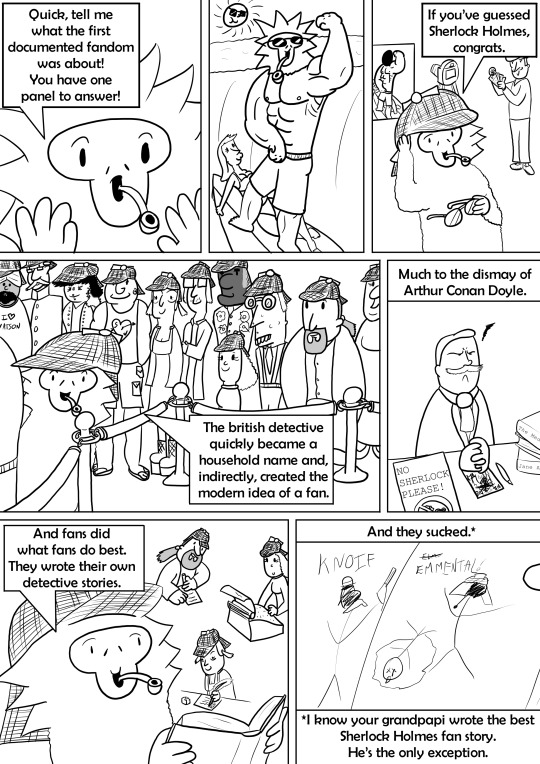
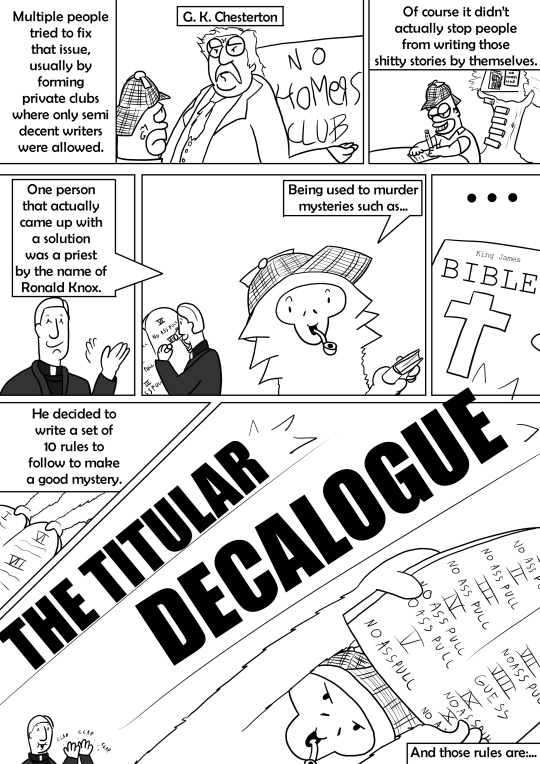

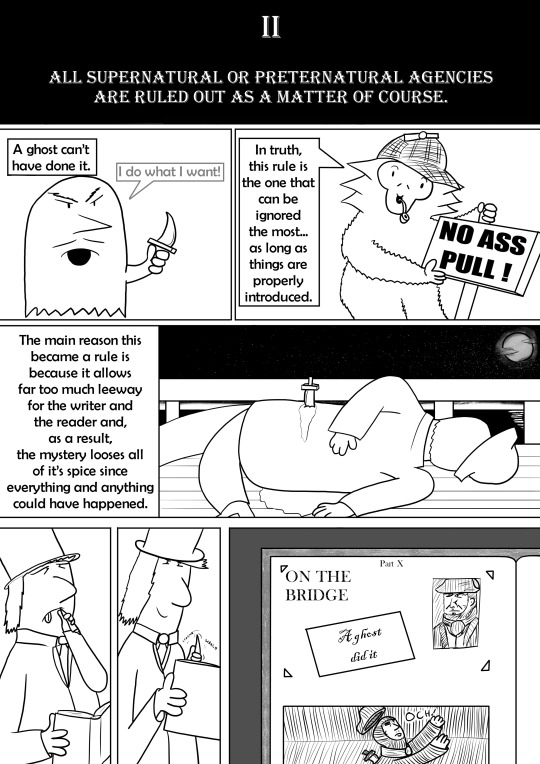
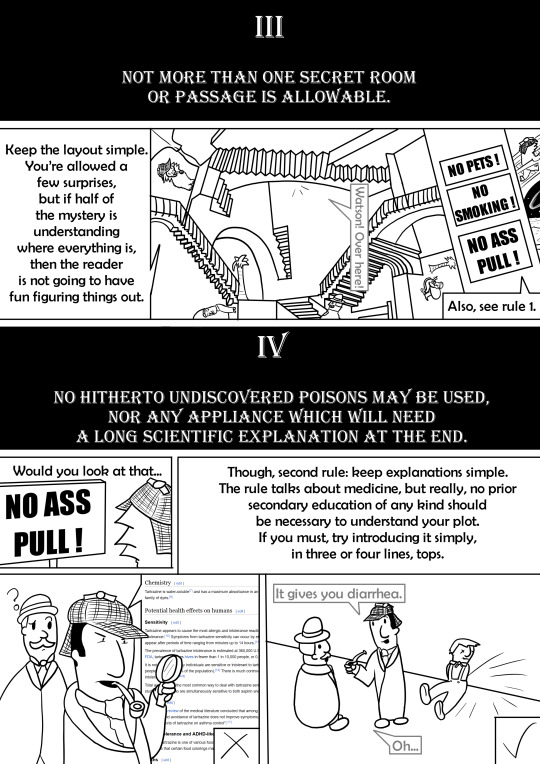
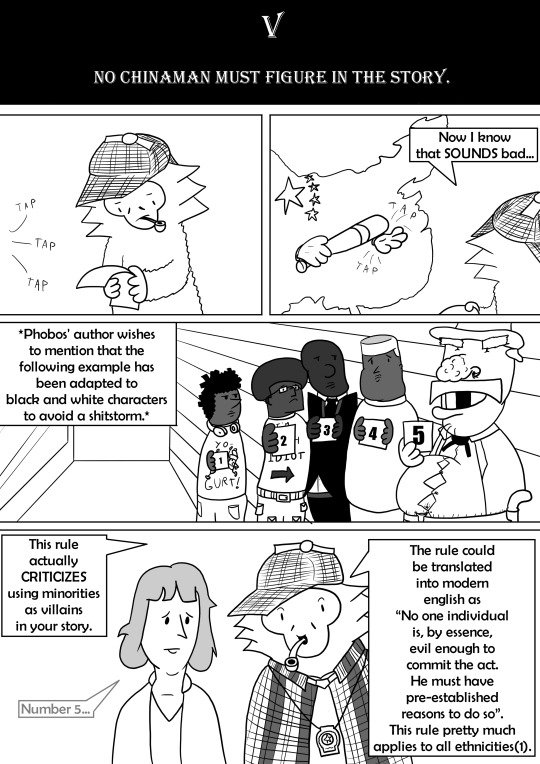
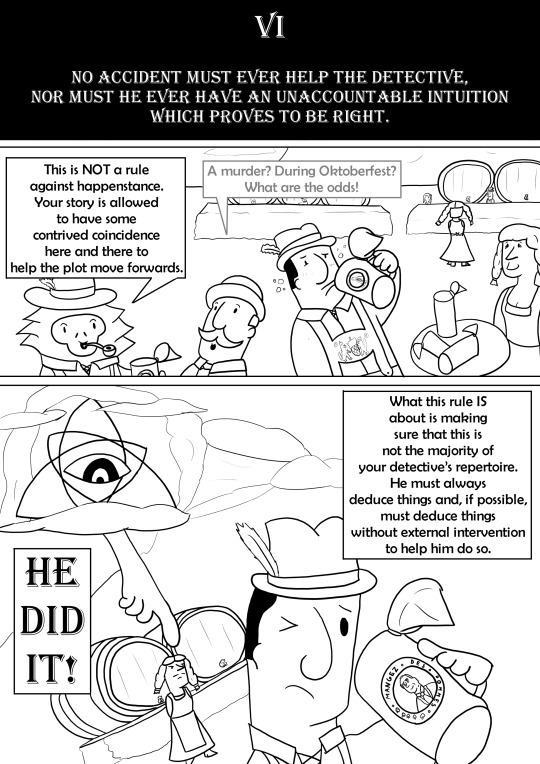
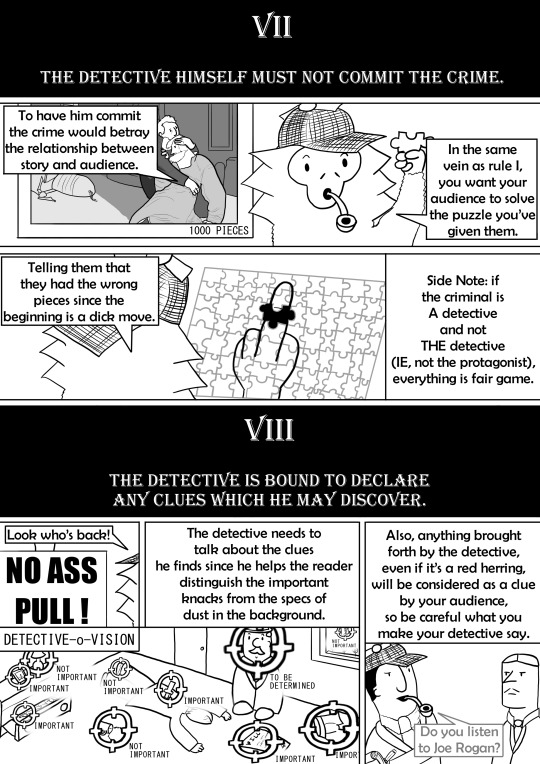
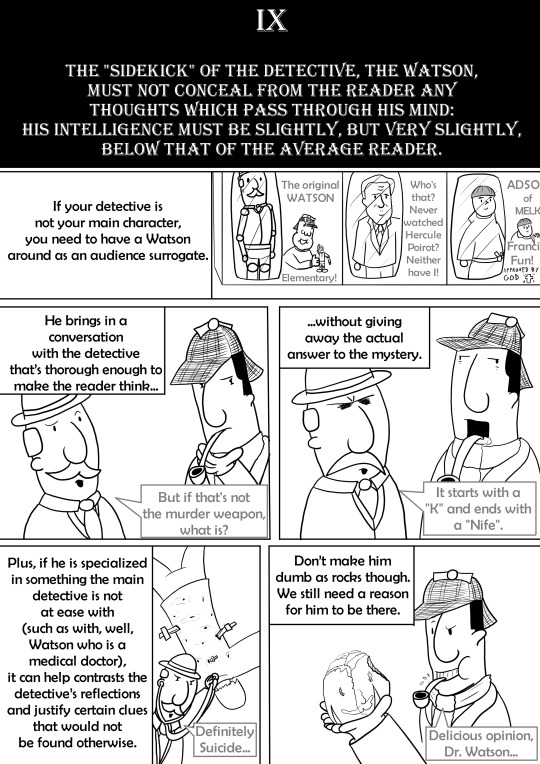
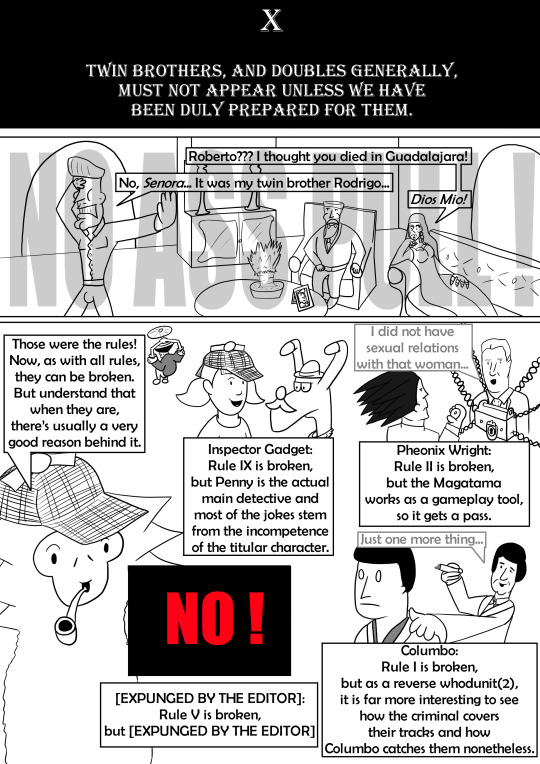
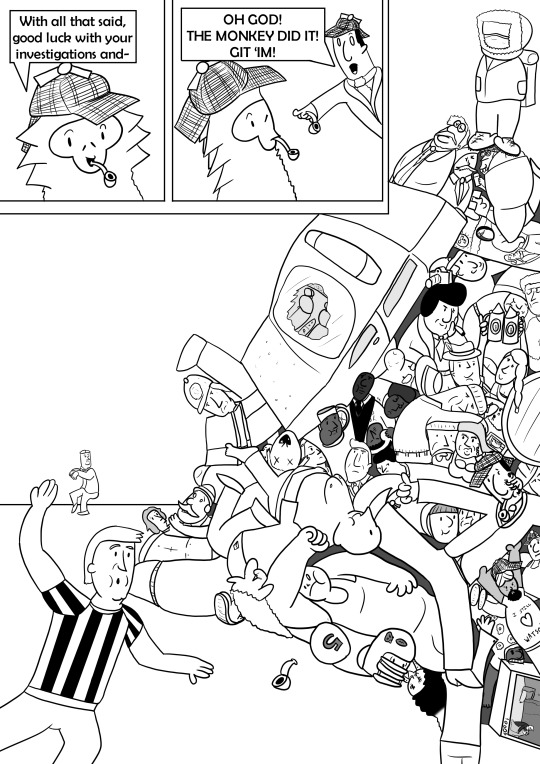
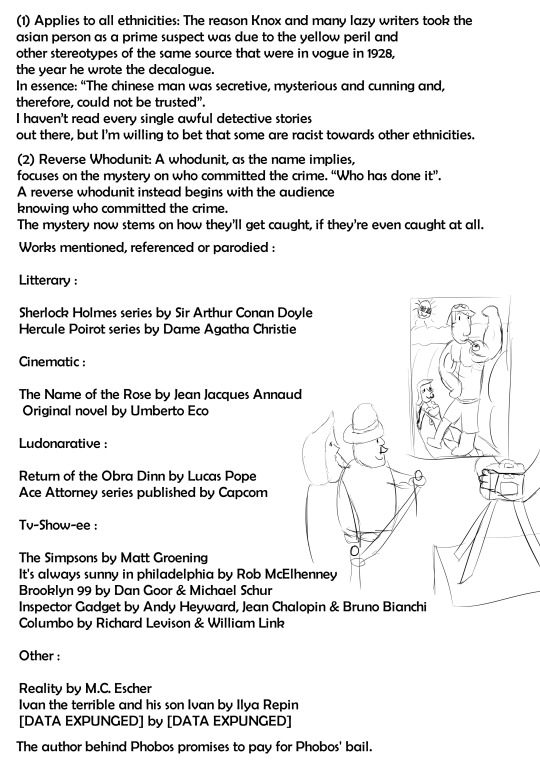
Knox's Decalogue and you
#monkey#writeblr#Knox's Decalogue#Detective#mystery#writing#comics#comic#writers on tumblr#Reality by MC Escher is a bitch to draw
7 notes
·
View notes
Text
guy who's playing ghost trick immediately after reading umineko: missile is a coping mechanism made up by kamila
#ghost trick spoilers#me following knox's decalogue to solve a clearly supernatural mystery: yes i am doing this right#umineko spoilers#kinda
10 notes
·
View notes
Text
By: Michael Shermer
Published: Aug 9, 2023
There is arguably no better known set of moral precepts than the Ten Commandments. As an exercise in moral casuistry, in this essay, excerpted from my chapter on religion in my 2015 book The Moral Arc, let’s consider them again in the context of how far the moral arc has bent since they were decreed over three millennia ago. (The Ten Commandments are stated in two books of the Old Testament, Exodus 20:1-17 and Deuteronomy 5:4-21. I quote from Exodus, King James Version.) In the next essay I shall reconstruct them from the perspective of a science- and reason-based moral system.
I. Thou shalt have no other gods before me.
First, this commandment reveals that polytheism was commonplace at the time and that Yahweh was, among other things, a jealous god (see God’s own clarification in Commandment 2). Second, it violates the First Amendment of the U.S. Constitution in that it restricts freedom of religious expression (“Congress shall make no law respecting an establishment of religion, or prohibiting the free exercise thereof”), making the posting of the Ten Commandments in public places such as schools and courthouses unconstitutional.
II. Thou shalt not make unto thee any graven image, or any likeness of any thing that is in heaven above, or that is in the earth beneath, or that is in the water under the earth. Thou shalt not bow down thyself to them, nor serve them: for I the LORD thy God am a jealous God, visiting the iniquity of the fathers upon the children unto the third and fourth generation of them that hate me.
This commandment is also in violation of the First Amendment’s guarantee of the freedom of speech, of which artistic expression is included by precedence of many Supreme Court cases (“Congress shall make no law…abridging the freedom of speech”). It also brings to mind what the Taliban did in Afghanistan when they destroyed ancient religious relics not approved by their Islamist masters. Elsewhere in the Bible, the word “idol” is synonymously used, with the Hebrew word pesel translated as an object carved or hewn out of stone, wood or metal.
What, then, are we to make of the crucifix, worn by millions of Christians as an image, an idol, a symbol of what Jesus suffered for their sins? The crucifix is a graven image of torture as it was commonly practiced by the Romans. If Jews today were suddenly to start sporting little gas chambers on gold necklaces the shocked public reaction would be as unsurprising as it would be unmistakable.
I the LORD thy God am a jealous God.
That might explain the genocides, wars, conquests, and mass exterminations commanded by the deity of the Old Testament. These humanlike emotions reveal Yahweh to be more like a Greek god, and much like an adolescent, who lacks the wisdom to control his passions.
The last part of this commandment—visiting the iniquity of the fathers upon the children unto the third and fourth generation of them that hate me—violates the most fundamental principle of Western jurisprudence developed over centuries of legal precedence that one can be only be guilty of one’s own sins and not the sins of one’s parents, grandparents, great grandparents, or anyone else for that matter.
III. Thou shalt not take the name of the Lord thy God in vain, for the LORD will not hold him guiltless who takes his name in vain.
This commandment is once again an infringement on our Constitutionally-guaranteed right to free speech and religious expression, and another indication of Yahweh’s petty jealousies and un-Godlike ways.
IV. Remember the Sabbath day, to keep it holy.
Again, freedom of speech and religious expression means we may or may not choose to treat the Sabbath as holy, and the rest of this commandment—For in six days the LORD made heaven and earth, the sea, and all that is in them, and rested on the seventh day. Therefore the LORD blessed the Sabbath day and made it holy—make it clear that its purpose is to once again pay homage to Yahweh.
Thus far, the first four commandments have nothing whatsoever to do with morality as we understand it today in terms of how we are to interact with others, resolve conflicts, or improve the survival and flourishing of other sentient beings. At this point the Decalogue is entirely concerned with the relationship of humans and god, not humans and humans.
V. Honor thy father and thy mother.
As a father myself, this commandment feels right and reasonable, since most of us parents appreciate being honored by our children, especially because we’ve invested considerable love, attention, and resources into them. But “commanding” honor—much less love—doesn’t ring true to me as a parent, since such sentiments usually come naturally anyway. Plus, commanding honor is an oxymoron, made all the worse by the hint of a reward for so doing, as in the rest of that commandment: “that thy days may be long upon the land which the lord thy God giveth thee.” Honor either happens naturally as a result of a loving and fulfilling relationship between parents and offspring, or it doesn’t. For a precept to be moral, it must involve an element of choice between doing something entirely self-serving and doing something that helps another, even at the cost of oneself.
VI. Thou shalt not kill.
Finally, we get a genuine moral principle worth our attention and respect. Yet even here, much ink has been spilled by biblical scholars and theologians about the difference between murder and killing (such as in self-defense), not to mention all the different types of killing, from first-degree murder to manslaughter, along with mitigating circumstances and exclusions, such as self-defense, provocation, accidental killings, capital punishment, euthanasia, and of course war.
Many Hebrew scholars believe that the prohibition is against murder only. But what are we to make of the story in Exodus (32:27-28) in which Moses brought down from the mountain top the first set of tablets, which he smashed in anger, and then commanded the Levites: “Thus saith the lord God of Israel, put every man his sword by his side, and go in and out from gate to gate throughout the camp, and slay every man his brother, and every man his companion, and every man his neighbor. And the children of Levi did according to the word of Moses: and there fell of the people that day about three thousand men.”
How can we reconcile God’s commandment not to kill anyone with his commandment to kill everyone? In light of this account, and many others like it, the sixth commandment should perhaps read thus: Thou shalt not kill—not unless the Lord thy God says so. Then shalt thou slaughter thine enemies with abandon.
VII. Thou shalt not commit adultery.
Coming from a deity who impregnated somebody else’s fiancé, that’s a bit rich. However, the bigger issue is that this commandment, like all the others, is a blunt instrument that doesn’t take into account the wide variety of circumstances in which people find themselves. Surely grownups in intimate relationships can and should negotiate the details of their relationship for themselves, and one hopes that they’ll act honorably toward their partner out of a sense of integrity, and not because a deity told them to.
VII. Thou shalt not steal.
Again, do we really need a deity to command this? All cultures had and have moral rules and legal codes about theft.
IX. Thou shalt not bear false witness against thy neighbor.
Anyone who has been lied to or gossiped about can explain why this moral commandment makes sense and is needed, so chalk one up for the Bible’s authors whose insights here were spot on.
X. Thou shalt not covet thy neighbor’s house, thou shalt not covet thy neighbor’s wife, nor his manservant, nor his maidservant, nor his cattle, nor anything that is thy neighbor’s.
Consider what it means to covet something—to crave or want or desire it—so this commandment is the world’s first thought crime, which goes against centuries of Western legal codes. More to the point, the very foundation of capitalism is the coveting or desire for things and, ironically, it is Bible-quoting Christian conservatives who most defend the very coveting forbidden in this final mandate.
The late Christopher Hitchens best summed up the implications of taking this commandment seriously, in an April 2010 Vanity Fair essay: “Leaving aside the many jokes about whether or not it’s okay or kosher to covet thy neighbor’s wife’s ass, you are bound to notice once again that, like the Sabbath order, it’s addressed to the servant-owning and property-owning class. Moreover, it lumps the wife in with the rest of the chattel (and in that epoch could have been rendered as ‘thy neighbor’s wives,’ to boot).”
After demolishing the Decalogue in his inimitable style, Hitchens proffered his own list of commandments:
• Do not condemn people on the basis of their ethnicity or color. • Do not ever use people as private property. • Despise those who use violence or the threat of it in sexual relations. • Hide your face and weep if you dare to harm a child. • Do not condemn people for their inborn nature—why would God create so many homosexuals only in order to torture and destroy them? • Be aware that you too are an animal and dependent on the web of nature, and think and act accordingly. • Do not imagine that you can escape judgment if you rob people with a false prospectus rather than with a knife. • Turn off that fucking cell phone—you have no idea how unimportant your call is to us. • Denounce all jihadists and crusaders for what they are: psychopathic criminals with ugly delusions. • Be willing to renounce any god or any religion if any holy commandments should contradict any of the above.”
Hitchens caps his list in summary judgment: “In short: Do not swallow your moral code in tablet form.”
Now, that is a rational prescription! In my next Skeptic column here I will offer my own “Provisional Rational Decalogue.” So you don’t miss it please consider subscribing below.
#Michael Shermer#Christopher Hitchens#decalogue#ten commandments#the ten commandments#morality#christianity#judaism#old testament#bible#bible study#religion#religion is a mental illness
10 notes
·
View notes
Text
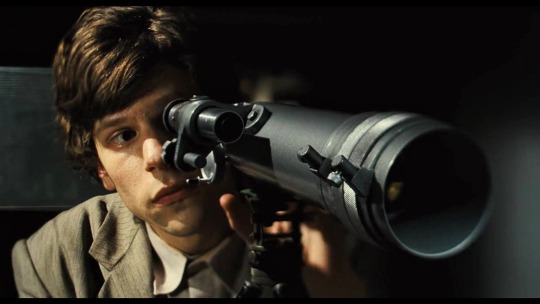
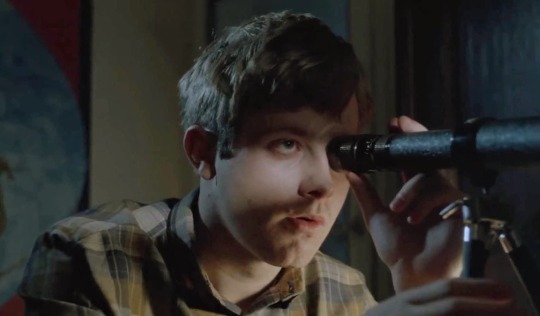

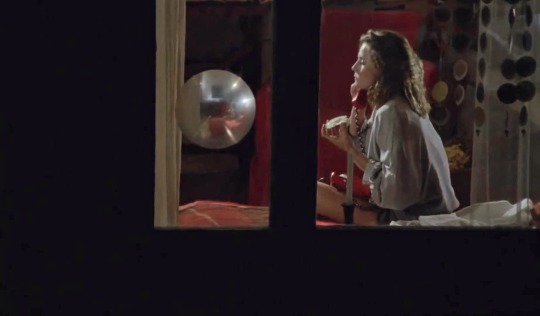
The Double (2013) // Decalogue VI (1989)
4 notes
·
View notes
